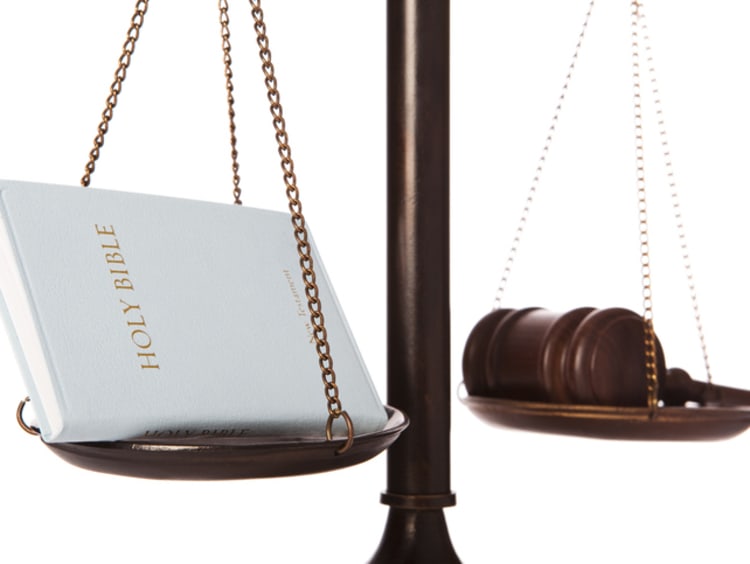Theology Thursday: God in My Politics

Our current political climate is filled with hate, distrust and division. However, Jesus shows us a better way. Jesus recruited two political rivals, Matthew the tax collector and Simon the Zealot, to be two of the twelve apostles. Like the Lord showed us, God is most prevalent in our politics when we view unbelievers not as enemies, but as people whom God loves.
Moreover, God has big plans for his church: the growth of the kingdom. Allowing political differences to distract and divide the church derails us from our mission and damages our unified witness before the world.
In This Article:
- Our Fractured Political Climate
- Jesus’s Surprising Call of Two Politics Enemies To Be His Disciples
- Our Two-Fold Response
Our Fractured Political Climate
At the time of this article, we are in the thick of the 2024 presidential primary season, and all signs point to a rematch between Joe Biden and Donald Trump for president. The 2020 presidential election was dramatic and contentious, 2024 may top it. Many of us cannot see eye-to-eye when it comes to political beliefs, so much so that it commonly appears difficult to love those on the other side of the political spectrum.
Though society may be in the grips of a maelstrom of hate, it should really bother us as Christians. Are we not supposed to be different? What’s the way forward? Who can heal our political divide? As with all things, the Lord shows us the way.
Jesus’s Surprising Call of Two Politics Enemies To Be His Disciples
Matthew 10:2-4 provides readers with the men that the Lord Jesus called to follow him during his earthly ministry: “The names of the twelve apostles are these: first, Simon, who is called Peter, and Andrew his brother; James the son of Zebedee, and John his brother; Philip and Bartholomew; Thomas and Matthew the tax collector; James the son of Alphaeus, and Thaddaeus; Simon the Zealot, and Judas Iscariot, who betrayed him,” (ESV).
At first glance, there does not appear to be anything that is relevant to healing political divisions; it’s just a list. However, two of the apostles have interesting descriptors. Verse 3 notes that Matthew is a “tax collector,” and in verse 4, the second Simon listed is a “Zealot.” These designations hint at deep political divisions that permeated the first-century world of Jesus. The Jews did not have their own independent nation. They were under the harsh rule of the Roman Empire. The Romans violently suppressed any rebellion against their authority.
Matthew, before meeting Jesus, was a tax collector. Though he was Jewish, many Jews viewed him as a traitor to the Jewish people because he collected taxes on behalf of the hated Roman government. And it was a common practice for tax collectors to give the Romans their due and charge people extra so that they could become rich. It was a cushy job — if one did not mind exploiting his neighbor.
On the other side of the political spectrum was Simon, known by the term Zealot. The Zealots were pro-Jewish patriots who despised Roman rule. They wanted the Jews to have an independent nation again and they were willing to have it by any means necessary. The most extreme of the Zealots carried daggers hidden in their cloaks and would assassinate Roman officials that they found in crowds and then disappear again into the same crowd.
Thus, we can assume, that Matthew and Simon were sworn enemies. According to how the world operates, they had no business associating with one another. In contrast, Jesus did not operate by the world’s rules. He invited these enemies on opposite sides of the political divide to be his disciples! Why? For Jesus, all human beings were made in his image and all needed salvation. Matthew was just as sinful as Simon and vice versa.
Humans tend to divide people by nationality, political party and so many other ways. Jesus did not. In recruiting the leaders of the nascent Christian church, he was forming a new society, a new group of people that would be a worldwide family. Jesus was not on the “side” of Matthew and the Romans or Simon and the Zealots. Instead, he had his father’s mission to tend to: the growth of the Kingdom of God.
Our Two-Fold Response
An examination of Matthew 10:2-4, and its historical context, would imply that Jesus’s response to political divisions was radically different than how people in the first century and today view such divisions. What are some specific points of application that will help us to navigate the choppy political waters that we find ourselves in?
1. Love Your Enemies
The first point is to love our enemies, as Christ modeled for us and commanded us to do (Mt. 5:43-48). These next seven-plus months in the political sphere will likely increase in coarseness, brutality and one-upmanship. Then, mercifully, we should have a winner come November. In the interval, we as Christians will be tempted to demonize unbelievers (and other believers) who hold views different from ours. Our opponents may even hold views that we consider to be anti-biblical.
However, Jesus calls us to do something higher than engaging in caustic political conversations on social media, watching hours of polarizing left-leaning or right-leaning political news coverage daily, or even striving to win a political election.
He calls us to love the people that society says we should detest. He does not care if someone is a Republican, a Democrat or an Independent. What he cares about is whether that person knows him as their personal Lord and Savior. Remember that the person who has a different view regarding securing the southern border, for example, is a person whom Christ loved so much that he died on the cross to save them. Back away from the political battle for more than a moment and see the real battle that’s going on, a spiritual battle for the souls of people that has eternal consequences (Eph. 6:10-12).
2. Be Salty!
Second, be salty! No, I do not mean to be rude. Christ has called us to be salt (Mt. 5:13). Salt has a distinct flavor; nothing tastes quite like salt. The world may be divided and lust after political power, but Christians are supposed to be different. We are supposed to walk in unity with one another and be focused, first and foremost, on the growth of the kingdom.
Apostle Paul admonished the Corinthians “that there be no divisions among you, but that you be united in the same mind and the same judgment,” (1 Cor. 1:10). If we as Christians cannot overlook and respect the political differences that we have and still be unified under Christ, what type of message does that communicate to the world? Not a good one. The church will be just as divided as our society. We will have lost our saltiness.
During this election cycle, let’s rise above all the hate and division and embrace the way of Jesus. Doing so will ensure that God is in every aspect of our politics.
Grand Canyon University is dedicated to helping all the members of the GCU community grow and build a relationship with God. Take look at our Christian identity and mission. If you are interested in exploring a degree program within GCU's College of Theology, fill out the form on this page to learn more about joining our Christian learning community.
Approved by faculty for the College of Theology on March 7, 2024.
The views and opinions expressed in this article are those of the author’s and do not necessarily reflect the official policy or position of Grand Canyon University. Any sources cited were accurate as of the publish date.


